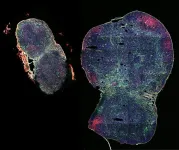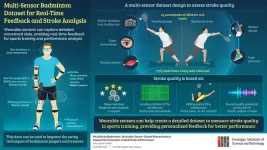(Press-News.org) Research Highlights:
A personalized screening algorithm for preeclampsia in the first trimester of pregnancy may help clinicians better predict who is at risk for developing the condition and who may benefit from treatment with a daily, low-dose aspirin.
In this study of more than 7,000 women, the new screening method, which combined maternal history, biomarker tests and ultrasound tests, was better at identifying preeclampsia risk in than current risk factor-based guidelines.
Embargoed until 4 a.m. CT/5 a.m. ET Monday, May 6, 2024
DALLAS, May 6, 2024 — A new screening algorithm for preeclampsia combining maternal history, ultrasound data and several tests for blood markers may better predict the majority of preeclampsia cases in the first trimester of pregnancy, when it may still be preventable, according to new research published today in Hypertension, an American Heart Association journal.
Preeclampsia is the most dangerous form of high blood pressure during pregnancy (blood pressure measures ≥140/90 mm Hg), and it is a leading cause of maternal death worldwide. Preeclampsia is potentially life-threatening when untreated. It affects 1 in 25 pregnancies in the U.S. and is more common in first-time pregnancies. Symptoms include headaches, vision changes and swelling of the mother’s hands, feet, face or eyes; or a change in the well-being of the baby. Recent research has found that preeclampsia can be linked to an increased risk of developing cardiovascular complications for women later in life.
“Preeclampsia is one of the most severe illnesses of pregnancy and may lead to preterm birth and/or maternal death,” said senior study author Emmanuel Bujold, M.D., M.Sc., professor in the department of obstetrics and gynecology at the Université Laval in Québec City, Canada.
The biological mechanisms that lead preeclampsia usually start in the first trimester of pregnancy (weeks 1 through 12), however, the initial symptoms of preeclampsia most often do not appear before week 20, Bujold noted.
The current risk factor-based guidelines from the American College of Obstetricians and Gynecologists (ACOG) recommend pregnant women take aspirin if they have a major risk factor such as chronic high blood pressure, Type 2 diabetes, chronic kidney disease, lupus or preeclampsia in a prior pregnancy. Aspirin is also recommended by ACOG for pregnant women with two moderate risk factors such as being a Black woman, having a sister or mother with history of preeclampsia, having a first pregnancy, obesity or an IVF pregnancy.
“Following those guidelines, almost all Black women should take aspirin during pregnancy, as should about one-third of all women of other races and ethnicities,” Bujold said.
Previous studies from the Fetal Medicine Foundation have found that preterm preeclampsia, defined as developing preeclampsia before 37 weeks of gestation, can be predicted in the first trimester using a combination of ultrasound and blood biomarker tests. In this study, researchers recruited over 7,000 women with first-time pregnancies across Canada who were between 11 and 14 weeks pregnant to evaluate the Fetal Medicine Foundation’s screening model. The model consisted of maternal history, ultrasound data and several tests for blood markers.
The study found:
Using the Fetal Medicine Foundation’s screening model for participants between 11 and 13 weeks of pregnancy, the preeclampsia detection rate was 63.1% for preterm preeclampsia (before 37 weeks of gestation) and 77.3% for early preeclampsia (before 34 weeks of gestation). The false positive rate was 15.8%.
Using the risk factor-based guidelines from the American College of Obstetricians and Gynecologists, the detection rate for preterm preeclampsia would be 61.5% and 59.1% for early preeclampsia, with a false-positive rate of 34.3%. This would be more than twice the false-positive rate of the Fetal Medicine Foundation’s screening model.
The only way to resolve preeclampsia once it has developed is to deliver the baby. A previous meta-analysis by the study authors found that taking one low-dose aspirin daily may reduce the risk of developing preeclampsia by up to 53%.
“Using this new screening model, treatment decisions were based on each individual’s personal risk,” Bujold said. “With their personal risk calculated, it’s much easier for a woman to make the right decision, for example, if she chooses to take daily low-dose aspirin, she is much more likely to follow through because it’s based on personalized screening test.”
Study background and details:
The study was conducted between 2014 and 2020 at five health centers across Canada. Of note: Canada has a national health care service, and coverage is universal for all Canadian citizens and permanent residents.
7,554 women who were pregnant for the first time were recruited between 11 and 14 weeks of pregnancy. 7,325 delivered after 20 weeks and remained eligible for the final analysis; 229 had pregnancies with fetal anomalies and were excluded from the analyses for the study.
At time of enrollment in the study, participants underwent screening for preeclampsia. The data collected included age, weight, ethnicity, smoking status and chronic health conditions (chronic hypertension, Type 1 diabetes or Type 2 diabetes and antiphospholipid syndrome, an autoimmune disease that may be associated with pregnancy complications).
The study participants had an average age of 29 years. 92% of participants self-identified as white; 4% as Black; 2.6% as South Asian; 0.9% as East Asian; 0.3% as First Nations; and 0.2% as mixed race or undetermined.
The study excluded women who were taking antihypertensive medication for chronic hypertension, low-dose aspirin or low-molecular-weight-heparin (a blood thinner) on a daily basis were excluded from the study.
Participants were followed until delivery. The primary outcome was preterm preeclampsia. The secondary outcome was early preeclampsia.
Of the 7,325 women included in the analysis, 65 (0.9%) developed preterm preeclampsia, and 22 (0.3%) developed early preeclampsia.
Among the study’s limitations, several women with risk factors for preeclampsia, such as high blood pressure and Type 2 diabetes before pregnancy, were not included in the study if they were already taking aspirin for preeclampsia prevention. This would make it difficult to determine whether this population would rely solely on the Fetal Medicine Foundation’s screening model to decide whether or not to take daily, low-dose aspirin, Bujold noted. Additionally, only one lab was used to analyze blood samples, and blood samples collected at other centers across Canada were frozen and shipped for analysis, meaning that biomarkers were measured several weeks after the blood was drawn, which may have affected the results.
“It's reasonable to believe that the inclusion of the entire population and immediate analysis of blood samples may both have improved the screening process. If we implemented a screening program in big cities across North America, the screening would be expected to be even better and more accurate,” Bujold said. “The good news is that we now have a more precise screening approach using existing tests that can predict preeclampsia early in pregnancy. The next step is to make this screening available to all pregnant women so that more women could receive a diagnosis early in pregnancy and begin preventative aspirin treatment, potentially preventing complications of severe preeclampsia.”
According to Sadiya S. Khan, M.D., M.Sc., FAHA, chair of the writing group for the Association’s 2023 scientific statement on Optimizing Prepregnancy Cardiovascular Health to Improve Outcomes in Pregnant and Postpartum Individuals and Offspring, predicting risk for term and preterm preeclampsia remains an important goal and priority to improve maternal health and mitigate disparities. Khan is the Magerstadt Professor of Cardiovascular Epidemiology and an associate professor of medicine and preventive medicine at the Northwestern University Feinberg School of Medicine in Chicago and a preventive cardiologist at Northwestern Medicine.
“Since the risks for preeclampsia may be largely influenced by health before pregnancy, the ability of a screening model to be applied in early pregnancy is very helpful and can initiate conversations between the clinician and patient about strategies to optimize heart health,” Khan said. “However, challenges remain with implementation of models such as this one that integrate biomarkers that are not routinely assessed and may not be widely available, especially among people in vulnerable populations who are most likely to have the highest risk for preterm preeclampsia.”
Co-authors, disclosures and funding sources are listed in the manuscript.
Studies published in the American Heart Association’s scientific journals are peer-reviewed. The statements and conclusions in each manuscript are solely those of the study authors and do not necessarily reflect the Association’s policy or position. The Association makes no representation or guarantee as to their accuracy or reliability. The Association receives funding primarily from individuals; foundations and corporations (including pharmaceutical, device manufacturers and other companies) also make donations and fund specific Association programs and events. The Association has strict policies to prevent these relationships from influencing the science content. Revenues from pharmaceutical and biotech companies, device manufacturers and health insurance providers and the Association’s overall financial information are available here.
Additional Resources:
Multimedia is available on the right column of release link http://newsroom.heart.org/news/personalized-screening-early-in-pregnancy-may-improve-preeclampsia-detection?preview=3ce33b2428f817ce1d7a432efe2ced08
After May 6, 2024, view the manuscript online.
AHA news release: Scheduled childbirth may greatly reduce preeclampsia, a leading cause of maternal death (April 2023)
AHA news release: Severe preeclampsia treated safely with nifedipine during labor and delivery (October 2022)
AHA news release: Following a Mediterranean-style diet during pregnancy may reduce the risk of preeclampsia (April 2022)
AHA health information: Preeclampsia and High Blood Pressure
Follow AHA/ASA news on X (formerly known as Twitter) @HeartNews
Follow news from AHA’s Hypertension journal @HyperAHA
###
About the American Heart Association
The American Heart Association is a relentless force for a world of longer, healthier lives. We are dedicated to ensuring equitable health in all communities. Through collaboration with numerous organizations, and powered by millions of volunteers, we fund innovative research, advocate for the public’s health and share lifesaving resources. The Dallas-based organization has been a leading source of health information for a century. During 2024 - our Centennial year - we celebrate our rich 100-year history and accomplishments. As we forge ahead into our second century of bold discovery and impact, our vision is to advance health and hope for everyone, everywhere. Connect with us on heart.org, Facebook, X or by calling 1-800-AHA-USA1.
END
Personalized screening early in pregnancy may improve preeclampsia detection
Study suggests more extensive screening method in the first trimester of pregnancy may improve detection of preeclampsia
2024-05-06
ELSE PRESS RELEASES FROM THIS DATE:
Expanding a lymph node, boosting a vaccine
2024-05-06
Expanding a lymph node, boosting a vaccine
A biomaterial vaccine enhances and sustains lymph node expansion following vaccination, boosting anti-tumor immunity in an animal model.
By Benjamin Boettner
(BOSTON) — Each one of us has around 600 lymph nodes (LNs) – small, bean-shaped organs that house various types of blood cells and filter lymph fluid – scattered throughout our bodies. Many of us have also experienced some of our LNs to temporarily swelling during infections with viruses or other pathogens. This LN expansion and subsequent contraction can also result from vaccines injected nearby, and in fact ...
GIST-MIT CSAIL researchers develop a biomechanical dataset for badminton performance analysis
2024-05-06
In sports training, practice is the key, but being able to emulate the techniques of professional athletes can take a player’s performance to the next level. AI-based personalized sports coaching assistants can make this a reality by utilizing published datasets. With cameras and sensors strategically placed on the athlete's body, these systems can track everything, including joint movement patterns, muscle activation levels, and gaze movements.
Using this data, personalized feedback is provided on player technique, along with improvement recommendations. Athletes can access this feedback anytime, and anywhere, making these systems versatile for athletes at ...
Study sheds light on 11th century Arab-Muslim optical scientist whose work laid ground for modern-day physics
2024-05-06
Scientists from the University of Sharjah and the Warburg Institute are poring over the writings of an 11th century Arab-Muslim polymath to demonstrate their impact on the development of optical sciences and how they have fundamentally transformed the history of physics from the Middle Ages up to modern times in Europe.
Their research focuses on the legacy of al-Ḥasan Ibn al-Haytham known in Latin as “Alhazen” and particularly his most influential work titled Book of Optics, reputed in Arabic as Kitab al-Manazir and first circulated in Europe via its Latin translation dubbed ‘Perspectiva’. Ibn ...
Rethinking “socially admitted” patients
2024-05-06
Labelling vulnerable patients in hospital as “socially admitted” may prevent treatment of medical issues, according to new research in CMAJ (Canadian Medical Association Journal) https://www.cmaj.ca/lookup/doi/10.1503/cmaj.231430.
Emergency departments are the last resort for some socially vulnerable people who may not have an acute or new medical issue. They may be seeking care because of a breakdown of supports or the inability of the patient, or their family, to cope with living at home. These people are known colloquially as “social admissions,” and other labels such as “orphan patient,” “failure ...
A better way to ride a motorcycle
2024-05-06
Motorcycles are designed to accommodate the average-sized rider, leaving taller and shorter riders vulnerable to discomfort.
A new study from the University of Waterloo used software that predicted realistic motorcycle riding behaviours, considering human factors and ergonomic trade-offs. It found that shorter and taller statures require joint adjustments to achieve their preferred riding posture.
Taller riders are required to flex their ankles, knees, hips and elbows more to interact with the motorcycle properly, ...
Survey of US parents highlights need for more awareness about newborn screening, cystic fibrosis and what to do if results are abnormal
2024-05-05
A national survey led by Ann & Robert H. Lurie Children’s Hospital of Chicago found that parents have insufficient knowledge of newborn screening in general and of cystic fibrosis (CF) in particular. Researchers asked specific questions about CF based on studies showing that initial CF follow-up visits after a positive newborn screening often occur after 4 weeks of age, which is later than the recommended timeframe for best outcomes. Later follow-up is associated with worse nutrition in childhood, a predictor of long-term health in CF. Parents ...
Outcomes of children admitted to a pediatric observation unit with a psychiatric comanagement model
2024-05-05
About The Study: The findings of this study show a significantly lower pediatric emergency department length of stay and inpatient psychiatric admission rate following pediatric observation unit care and potential savings in inpatient psychiatric resources without contributing to 30-day readmission rates.
Authors: Rachel G. Kasdin, M.S., of the Icahn School of Medicine at Mount Sinai in New York, is the corresponding author.
To access the embargoed study: Visit our For The Media website at this link https://media.jamanetwork.com/
(doi:10.1001/jamapediatrics.2024.1123)
Editor’s Note: Please see the article for additional information, including other authors, ...
SCAI announces 2024-25 SCAI-WIN CHIP Fellowship Recipient
2024-05-05
LONG BEACH (May 4, 2024) Mariem A. Sawan, MBBS, chief interventional cardiology fellow at Emory University, has been selected as the recipient of the SCAI-Women in Innovations (SCAI-WIN) CHIP Fellowship, the Society for Cardiovascular Angiography and Interventions announced today.
The $115,000 fellowship opportunity was made possible by support from Abiomed (founding supporter), Boston Scientific, Medtronic, and Shockwave Medical, Inc., and is offered to interventional cardiology (IC) fellows or practicing interventional cardiologists ...
SCAI’s 30 in Their 30’s Award recognizes the contributions of early career interventional cardiologists
2024-05-05
LONG BEACH (May 4, 2024) During SCAI 2024 Scientific Sessions, the Society for Cardiovascular Angiography & Interventions (SCAI) presented its "30 in Their 30’s" award to thirty early-career interventional cardiologists.
This award program recognizes the excellence of these members for their outstanding leadership and demonstration of SCAI's core values and is designed to encourage and support young interventional cardiologists who have already made a significant impact in the field.
Recipients include:
Aakash Garg, MD, FSCAI
Adnan Khalif, MD, FSCAI
Alejandro ...
SCAI Emerging Leaders Mentorship Program welcomes a new class of interventional cardiology leaders
2024-05-05
LONG BEACH (May 4, 2024) The Society for Cardiovascular Angiography & Interventions (SCAI) is pleased to announce the selection of 12 new early-career interventional cardiologists to participate in the 2024-2026 Emerging Leader Mentorship (ELM) Program.
The ELM Fellows program is a two-year training and mentorship program designed to help participants enhance their skills and prepare for leadership positions in medicine. The program is offered in collaboration with the American College of Cardiology and the Cardiovascular Research Foundation.
The ELM Selection Committee chose 12 individuals based on their leadership ...
LAST 30 PRESS RELEASES:
Justice after trauma? Race, red tape keep sexual assault victims from compensation
Columbia researchers awarded ARPA-H funding to speed diagnosis of lymphatic disorders
James R. Downing, MD, to step down as president and CEO of St. Jude Children’s Research Hospital in late 2026
A remote-controlled CAR-T for safer immunotherapy
UT College of Veterinary Medicine dean elected Fellow of the American Academy of Microbiology
AERA selects 34 exemplary scholars as 2026 Fellows
Similar kinases play distinct roles in the brain
New research takes first step toward advance warnings of space weather
Scientists unlock a massive new ‘color palette’ for biomedical research by synthesizing non-natural amino acids
Brain cells drive endurance gains after exercise
Same-day hospital discharge is safe in selected patients after TAVI
Why do people living at high altitudes have better glucose control? The answer was in plain sight
Red blood cells soak up sugar at high altitude, protecting against diabetes
A new electrolyte points to stronger, safer batteries
Environment: Atmospheric pollution directly linked to rocket re-entry
Targeted radiation therapy improves quality of life outcomes for patients with multiple brain metastases
Cardiovascular events in women with prior cervical high-grade squamous intraepithelial lesion
Transplantation and employment earnings in kidney transplant recipients
Brain organoids can be trained to solve a goal-directed task
Treatment can protect extremely premature babies from lung disease
Roberto Morandotti wins prestigious Max Born Award for pioneering research in quantum photonics
Scientists map brain's blood pressure control center
Acute coronary events registry provides insights into sex-specific differences
Bar-Ilan University and NVIDIA researchers improve AI’s ability to understand spatial instructions
New single-cell transcriptomic clock reveals intrinsic and systemic T cell aging in COVID-19 and HIV
Smaller fish and changing food webs – even where species numbers stay the same
Missed opportunity to protect pregnant women and newborns: Study shows low vaccination rates among expectant mothers in Norway against COVID-19 and influenza
Emotional memory region of aged brain is sensitive to processed foods
Neighborhood factors may lead to increased COPD-related emergency department visits, hospitalizations
Food insecurity impacts employees’ productivity
[Press-News.org] Personalized screening early in pregnancy may improve preeclampsia detectionStudy suggests more extensive screening method in the first trimester of pregnancy may improve detection of preeclampsia






